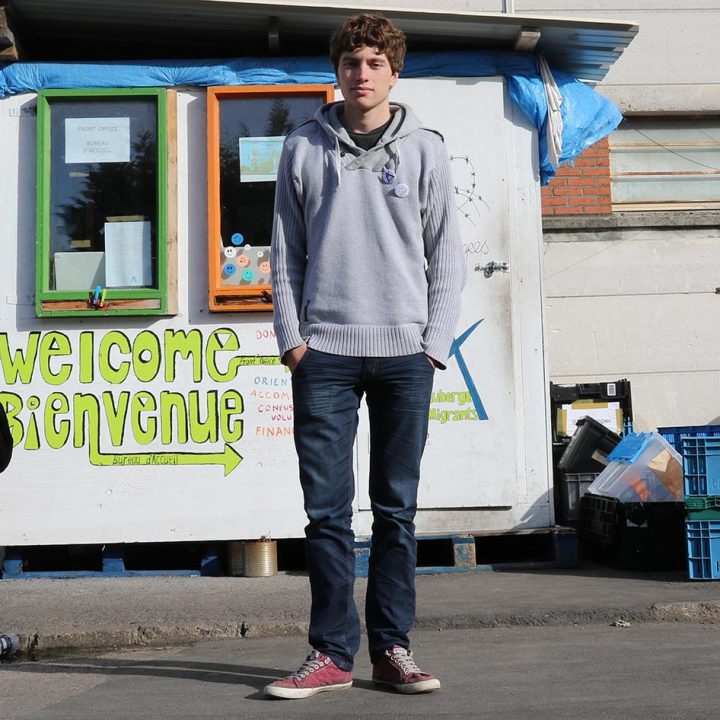A humanitarian worker’s defamation conviction on September 25, 2018, for an ironic tweet represents a dangerous escalation in official harassment of groups providing crucial aid to migrants, Human Rights Watch said today. It is the first conviction of its kind in France.
A court in Boulogne-sur-Mer, northern France, found Loan Torondel guilty of criminal libel for a tweet he sent out at the beginning of January and sentenced him to pay a fine, which it suspended, and court costs. Under a picture showing two police officers standing over a young man seated in a field, Torondel imagines the young man protesting that police have confiscated his sleeping bag when the temperature is 2 degrees Celsius (35.6 degrees Fahrenheit), and an officer responding, “Maybe, but we are the French nation, sir.”
“This sentence sets a dangerous precedent and is symptomatic of the pernicious ways French authorities seek to obstruct the work of humanitarian volunteers working with migrants and asylum seekers,” said Bénédicte Jeannerod, France director at Human Rights Watch.
This police officer’s fictitious rejoinder was an allusion to a speech President Emmanuel Macron gave in late December 2017 in which he urged the public to overcome adversity, saying, “Never forget, we are the French nation.” The phrase quickly became a derisive meme, including among those who objected to the treatment of migrants and other homeless people during the bitterly cold winter.
Torondel, 21, spent two years with the nongovernmental organization L’Auberge des Migrants in Calais, initially as a volunteer and then as head of its operations there, until July 2018, when he left to resume his studies.
The use of defamation charges against humanitarian workers is unprecedented in France. In Torondel’s case, the police officers pictured in the tweet filed a defamation complaint with the public prosecutor’s office, which then requested an investigation by the court on behalf of one of the men.
Defamation is a criminal offense in France, carrying a maximum penalty of 45,000 euros (US$ 52,950). Torondel received a suspended fine of 1,500 euros and was also assessed 500 euros in damages and 475 euros in court costs, neither of which was suspended. He is appealing the conviction.
International human rights law allows for restrictions on freedom of expression to protect the reputations of others, but such restrictions must be necessary and narrowly drawn. Criminal defamation laws are a disproportionate and unnecessary restriction on free speech and create a “chilling effect” that effectively restricts legitimate as well as harmful speech.
For these reasons, the UN special rapporteur on freedom of opinion and expression and the representative on freedom of the media of the Organization for Security and Co-operation in Europe (OSCE), together with the Organization of American States special rapporteur for freedom of expression, have concluded that criminal defamation is “not a justifiable restriction on freedom of expression” and have called for the abolition of such laws. In another joint statement, these authorities and the African Commission on Human and Peoples’ Rights special rapporteur on freedom of expression and access to information noted that criminal defamation laws are “a traditional threat to freedom of expression.”
The UN special rapporteur on freedom of opinion and expression has said that countries should take particular care to ensure that defamation laws – civil or criminal – “should never be used to prevent criticism of government” and “should reflect the principle that public figures are required to tolerate a greater degree of criticism than private citizens.”
Humanitarian workers in Calais have regularly reported harassment by police. Aid workers in Calais have told Human Rights Watch, the French Defender of Rights, and UN observers that police repeatedly fined them for minor infractions and parking violations and subjected them to repetitive identity checks. When aid workers photograph or film police – as they are permitted to do under French law – they say that some police have seized their phones temporarily to delete or look through the contents without permission. In some instances, humanitarian workers have said that police sprayed them with teargas, forced them to the ground, or pushed them.
In the period between November 2017 and July 2018, four aid groups working in Calais – Help Refugees, L’Auberge des Migrants, Utopia 56, and Refugee Info Bus – documented 600 instances of police intimidation against their staff and volunteers. They included excessive use of identity checks, arbitrary parking fines, pat-downs, threats, insults and other verbal abuse, and physical violence.
In July, the French Constitutional Council (Conseil d’État), the country’s highest court, ruled that helping others in need, including irregular migrants, is protected by the constitutional principle of fraternity.
“The court’s decision risks opening the door for authorities to circumvent the Constitutional Council’s ruling,” Jeannerod said. “Instead of criminalizing humanitarian workers who provide vital assistance to migrants and asylum seekers and expose abusive practices, the French authorities should put an end to these abuses and punish those responsible.”










